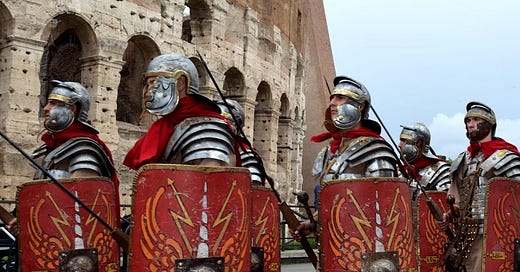The Romans Were Great and all That — But They Were Also Degenerate Paedos
Who Were the Actual Barbarians?
While working this week, I have been listening to Tom Holland’s PAX, the third in his series on Rome, and one thing stood out “The Romans Were Great and All That — But They Were Also Degenerate Paedos” and I kept asking myself, who were the actual Barbarians?
There was a meme doing the rounds not so long ago, saying that men are always thinking about the Roman Empire. And why not? Rome was immense. Roads, laws, legions. Discipline, glory, marble. It was empire in capital letters, a civilisation that still casts a shadow two millennia wide.
But for all the admiration, there’s a strange silence from its admirers about one of its most grotesque features: the systematic sexual exploitation of children, especially young boys. Not as scandal, not as crime, but as accepted, admired custom, a quiet horror under the marble façade.
If we’re going to think about Rome, then we’d better be honest about all of it. Because alongside the roads and the rhetoric, the Romans left behind something else: a legacy of depravity disguised as taste, an elite class obsessed with ‘small-headed’ boys.
The Puer Delicatus – ‘Civilised’ Predation
Among the Roman aristocracy, there was a special term for the boys they favoured, puer delicatus. These were young male slaves, often prepubescent, selected for their delicate features, their docility, notably, and especially their small heads.
This wasn’t metaphor. Roman poets and satirists spoke directly of the ideal boy having a “small head,” as if that were a recognised marker of desirability. The smaller the head, the more childlike the boy, and the greater the thrill of domination for the ‘man’ in the toga.
“You prefer a smooth boy with long limbs and a tiny head — a puer delicatus.”
— Martial, Epigrams 11.22
This wasn’t fringe behaviour. This was Rome’s elite culture.
The puer delicatus was often castrated to preserve his appearance. He was perfumed, groomed, dressed in silk, and passed around as both ornament and object. It was slavery, but with a sickly theatrical twist, the slave was supposed to look like he enjoyed it. His very form, his mannerisms, his voice, were bent to serve the fantasies of his master.
Nero and Sporus
No example captures this rot more fully than the story of Sporus, the young boy Emperor Nero had castrated and married, dressing him in the clothes of his dead wife Poppaea.
“He had the boy Sporus castrated and tried to turn him into a woman. He even called him by the name of his former wife and took him as a wife in every formal sense.”
— Suetonius, Nero 28
Before Tavistock, there was Nero….
Sporus was around 14, and bore a resemblance to Poppaea — whom Nero had kicked to death while she was pregnant. Sporus was a living replica, a flesh-crafted doll, mutilated and dressed to satisfy the emperor’s grief and grotesque desires.
Hadrian, you know the wall builder, and philosopher-emperor, had a special boy too, Antinous, a Bithynian youth drowned mysteriously in the Nile. Hadrian deified him, erected statues across the empire, and made him a god. But behind the marble was a familiar story: an older ruler, a beautiful boy, and a powerful man disguising his lust as love.
"The figure of an adolescent who was not merely beautiful but shimmeringly, and seductively Greek, obsessed the Roman erotic imagination. Playboys, pornographers, poets: all delighted in the fantasy. It was why delicati were so often given Greek names. That Antinous was not a slave but a free-born Bithynian – a native of the very land in which Hylas, Hercules’ exquisite pageboy, had met his watery doom – only compounded his allure. Hadrian, by taking such a lover, was merely doing what many a red-blooded Roman would have leapt at the chance to do. He was living the dream."
Barbarians in the Forest — Or in the Forum?
Rome mocked the British and Germanic tribes for painting their bodies, taking heads in war, and worst of all, drinking milk. The milk-drinking “barbarians” were seen as crude, backward, animalistic.
And yet:
“To corrupt boys is considered a monstrous act among the Germans.”
— Tacitus, Germania 19
That’s right, the tribes Rome called savages had stricter moral standards about children than the patricians of the capital. While Romans were hunting small-headed boys for their degenerate sexual desires, the tribes of the north were honouring kin, guarding youth, and punishing predators with tribal justice.
The northern warriors might take heads in battle, yes. But they didn’t collect small heads in silk, castrate them, parade them, rape them and call it taste.
One took heads of their enemies as trophies.
The other took the innocence of children — and called it high culture.
Civilisation in Perfume and Chains
Roman civilisation was a paradox. Grand and glorious, yes, but also drenched in blood and perversion. They perfected conquest and law, but they also perfected the aesthetics of domination.
Their cruelty wasn’t raw and tribal. It was polished, organised, domesticated.
Even the moralists cracked under the weight of it. The Stoic philosopher Musonius Rufus wrote:
“The man who molests boys loses his manhood more than the boy loses his.”
— Fragment 12
But voices like his were rare. Most Roman thinkers were far more concerned with the loss of a man’s virtue than with the suffering of the child.
The pain of the victim barely registered.
The Soft-Handed Elites of Today
And here’s where it lands, because this isn’t just ancient history. It’s not a dead moral world behind a museum case. It’s a mirror.
We too live in a society ruled by smooth-talking elites who wrap degeneracy in virtue. The ones who exploit children don’t wear togas, they wear suits and lanyards.
They speak at conferences about “inclusion” while redefining grooming as gender affirmation. They sneer at the rough-handed man who drinks beer, raises a family, and says what he means. They call him backward. A bigot. A “deplorable.”
All while they:
Expose children to sexual content in schools
Normalise irreversible medical procedures on teenagers
Protect predators in high places through polite silence and careful PR
They hunt heads too.
Not in battle — but in bathrooms, libraries, and schools.
They do not need Nero’s crown or Tiberius’s island. They have NGO committees, credentials, media coverage, and a language designed to hide everything in plain sight. Government sponsored grooming!
And once again, the man who says “This is wrong” the builder, the father, the milk-drinker, is called the real threat, the Barbarian.
A Final Word: Beware the Marble Mask
Rome built great things. But under its grandeur lay horror.
The same empire that laid roads across Europe also turned small boys and girls into sex objects en masse. The same senators who governed provinces gleefully watched children get raped, raped children themselves, and called it taste, called it civilisation.
It wasn’t accidental. It was systemic.
So the next time we are tempted to daydream about Rome, the sandals, the legions, the marble glory, let us also remember:
They hunted heads too.
But theirs were small, soft, and still alive.
They were dirty depraved paedos, and not amount of indoor plumbing or hot baths make up for that.
Give me the milk drinking barbarians any day!
If you enjoy my work and benefit from it, then please consider a paid subscription. I believe in the importance of this work, I want to keep it free to read for everyone and away from paywalls, this means I rely on your generosity, and for just the price of a beer each month, you can help contribute to this endeavour.






Great essay! I think the Romans have got a free pass for far too long, they were brillant propagandists, but were a thoroughly nasty bunch. The Scots warrior who said 'they make a desert and call it peace' was absolutely right.
We have imo built our civilisation on some very shaky foundations, Christianity infused with the Roman sensibilities, and now that we have drained civilisation of Christianity we are left with just the very nasty substrate. The Romans would be right at home in our society with its worship of money and power. (And Blessed Be the Cheesemakers)
This came across my emails in a timely way as I published an essay on the industrialized sexuality and the need to reunify sex with fertility this morning and a reader commented on how what I was naming and critiquing isn’t just a problem of technology, as I inferred, but a problem that goes back to the Roman Empire. I admittedly am not well versed at all in this history and am curious, so reading this was timed well. Do you recommend Holland’s book as a good place to begin?